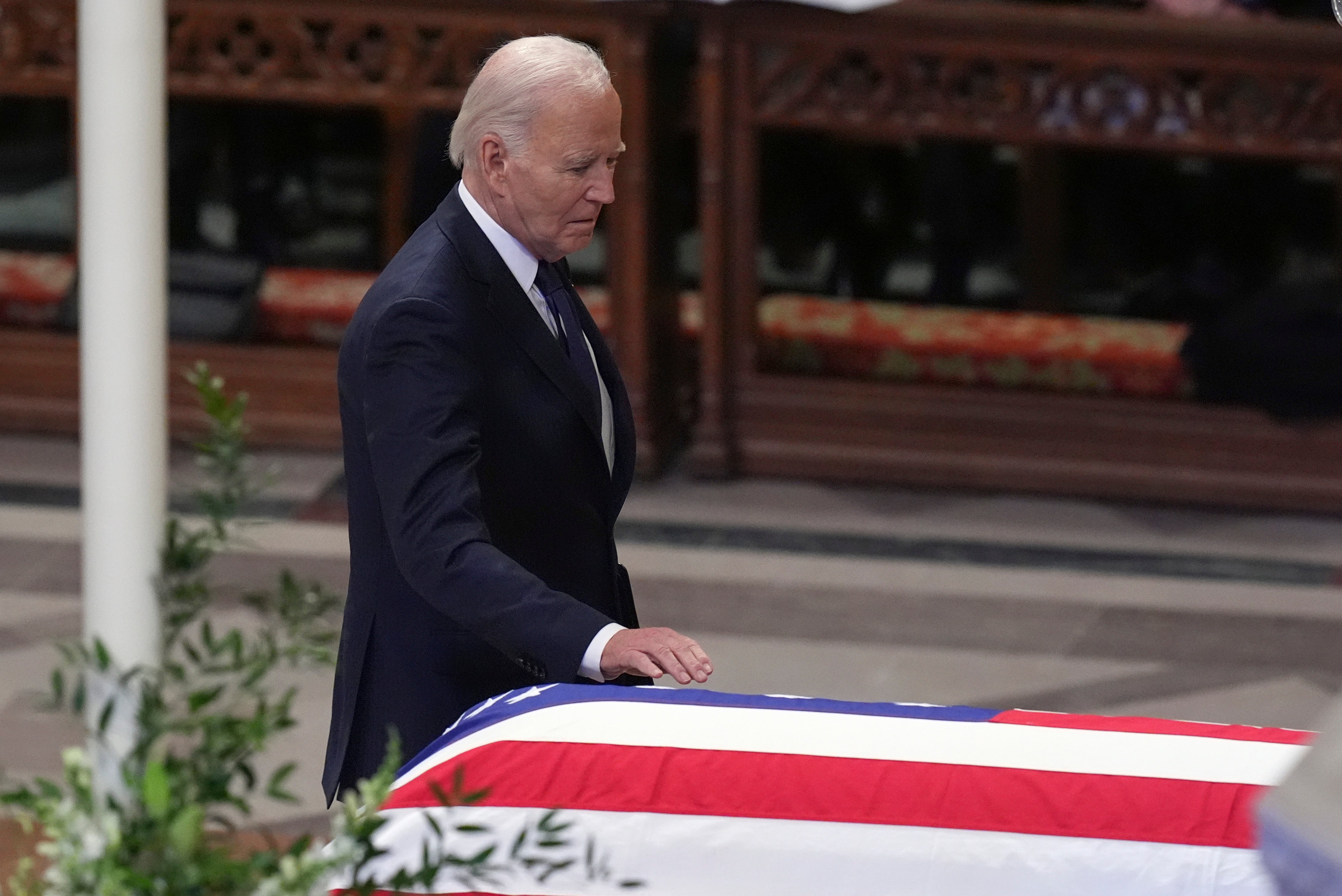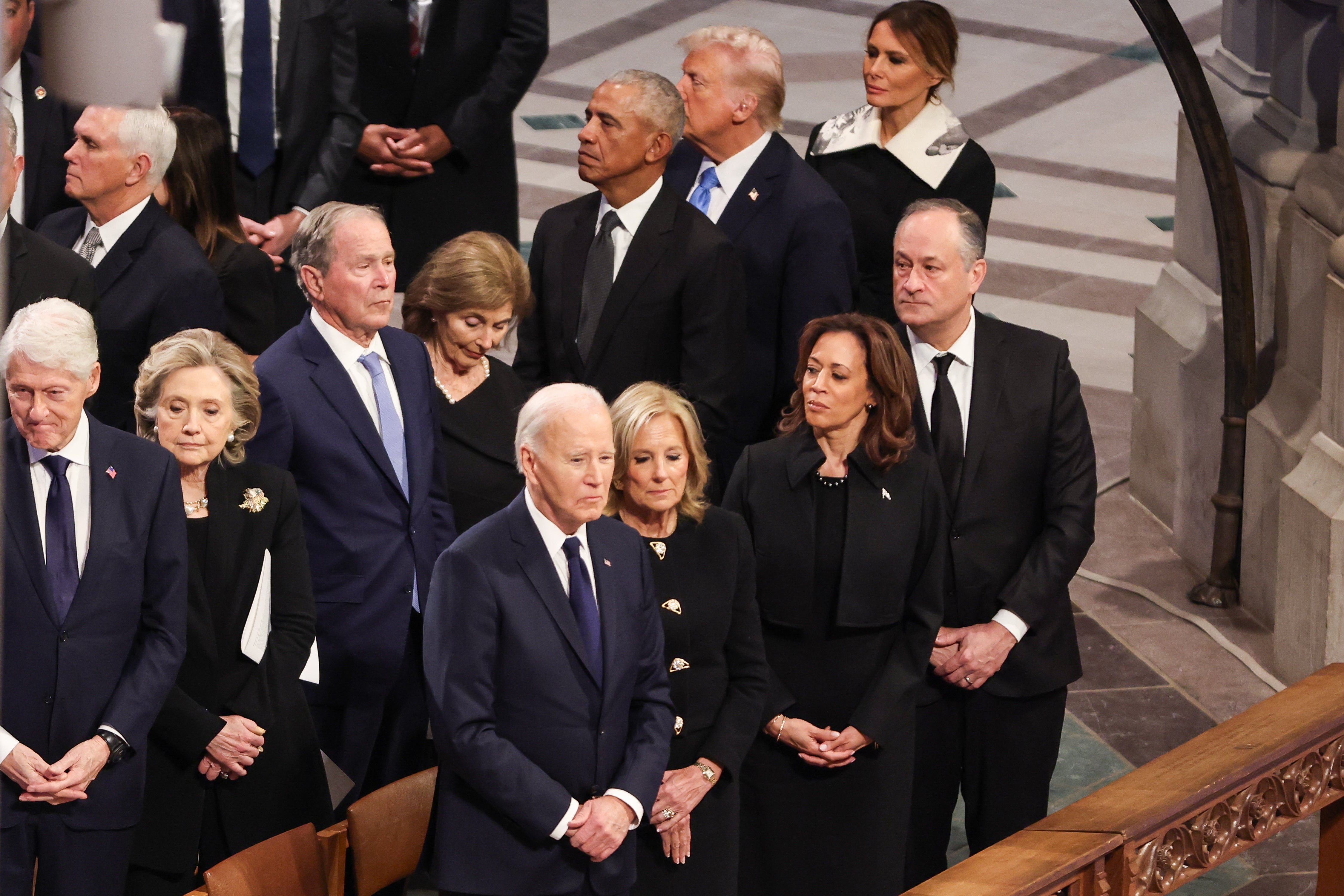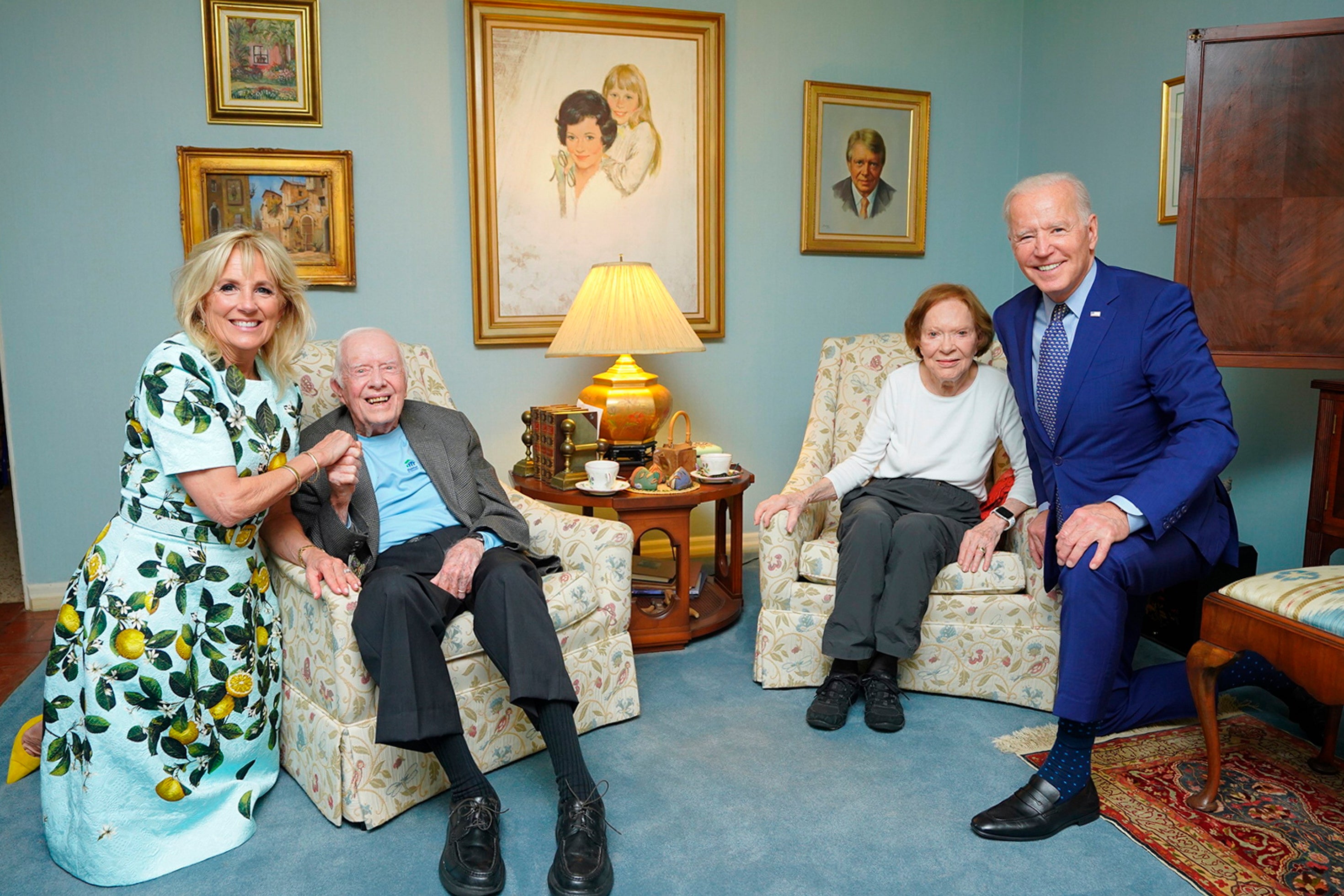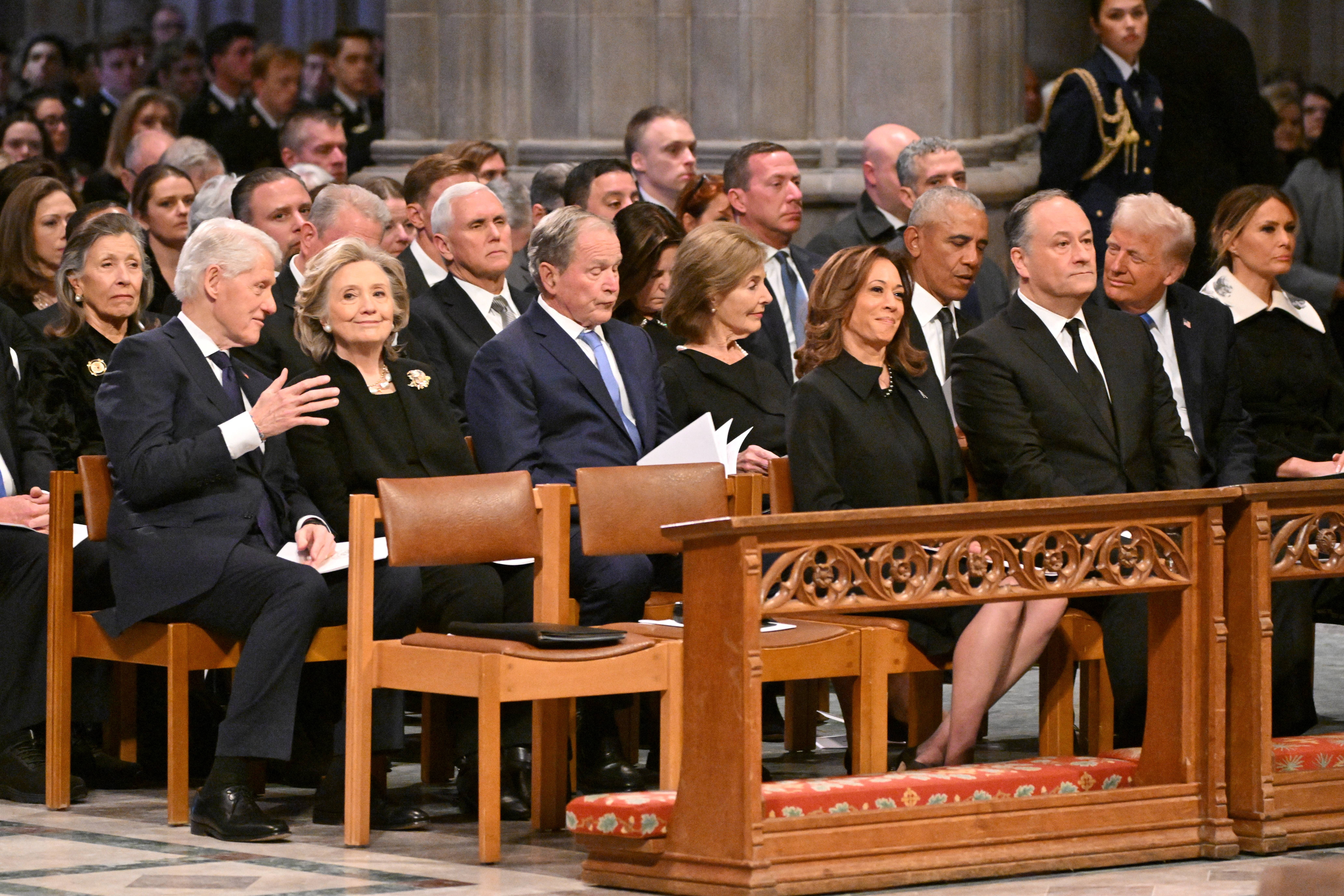Biden hails Jimmy Carter’s ‘strength of character’ in eulogy for 39th president
‘Throughout his life, he showed us what it means to be a practitioner of good works and a good and faithful servant of God and of the people,’ Biden said Thursday at a service attended by all living presidents

Your support helps us to tell the story
From reproductive rights to climate change to Big Tech, The Independent is on the ground when the story is developing. Whether it's investigating the financials of Elon Musk's pro-Trump PAC or producing our latest documentary, 'The A Word', which shines a light on the American women fighting for reproductive rights, we know how important it is to parse out the facts from the messaging.
At such a critical moment in US history, we need reporters on the ground. Your donation allows us to keep sending journalists to speak to both sides of the story.
The Independent is trusted by Americans across the entire political spectrum. And unlike many other quality news outlets, we choose not to lock Americans out of our reporting and analysis with paywalls. We believe quality journalism should be available to everyone, paid for by those who can afford it.
Your support makes all the difference.Every living American president filed into pews at the Washington National Cathedral on Thursday to honor one of their own at the funeral for Jimmy Carter who died late last month at 100 years old.
Ther 39th president was remembered as a compassionate Christian and progressive, despite serving a single term in the White House that was seen as a disappointment at the time.
President Joe Biden, who was the first senator to endorse Carter’s successful bid for the White House in 1976, eulogized Carter for having a “deep Christian faith in God” that informed his extraordinary life, during which he “never let the tides of politics divert him from his mission to serve and shape the world.”
“Throughout his life, he showed us what it means to be a practitioner of good works and a good and faithful servant of God and of the people,” said Biden, who praised Carter as having seen “well into the future” even though he had appeared to many as being a relic of “a bygone era.”
“A white southern Baptist who led us on civil rights, a decorated Navy veteran who brokered peace, a brilliant nuclear engineer who led on nuclear nonproliferation, a hard-working farmer who championed conservation and clean energy ... through it all, he showed us how character and faith start with ourselves and then flows to others,” he said.

Noting how Carter had risen from a humble beginning to “the pinnacle of power” while keeping his own faith at the center of the politics he practiced as leader of the free world, Biden recalled how as a freshman senator, he became the first member of the upper chamber to endorse the then-Georgia governor during his long shot bid for the Democratic presidential nomination in 1976.
He said his decision to endorse Carter at the time was based on the Georgian’s “most enduring attribute: character, character, character.”
“Jimmy Carter’s friendship taught me, and through his life, taught me, that strength of character is more than title or the power we hold. It’s the strength to understand that everyone should be treated with dignity, respect, that everyone, and I mean everyone, deserves an even shot,” Biden said.
He added that Carter’s life should be remembered as “the story of a man who was at once driven and devoted to making real the words of his Savior, the ideals of this nation” and one “who never let the tides of politics divert him from his mission to serve and shape the world.”
His remarks were delivered at a service that was the capstone of a weeklong celebration of a man whose century-long life saw him rise from a Georgia peanut farm with no indoor plumbing to become the leader of the free world before spending the last decades of his life as a roving diplomat and humanitarian whose work as a former president was almost universally revered and respected even by his most fervent opponents.
It was a rare moment of bipartisan comity combined with American ceremonial pomp and circumstance that was at the same time incongruous with the simple life Carter had lived in his decades-long post-presidency.

While many ex-presidents have taken to making lavish livings with paid speeches and service on corporate boards, Carter eschewed the trappings of status and wealth even as he built a legacy that many commentators say outshines his time in office.
As he founded and ran the Carter Center and spent decades as a roving diplomat, humanitarian and best-selling author (with books making up the majority of his post-presidential income) he remained in the same Plains, Georgia, home he had always shared with his wife Rosalynn — the same home where he will be buried alongside the former first lady, to whom he was married for 77 years.
Biden was joined in attendance by all of his predecessors — including president-elect Donald Trump, who was seen chatting with a smiling former president Barack Obama before the service program began.
Trump, who has spent the days leading up to the state funeral bashing both Biden and Carter — the former for his decision to protect a wide swath of ocean floor from oil drilling and the latter for shepherding the 1979 Panama Canal treaty through the Senate — also was reunited with his former vice president, Mike Pence.
As the president-elect and former (and future) first lady Melania Trump made their way to their seats in the cavernous cathedral, Pence rose to greet and shake hands with both as the two men appeared to exchanged pleasantries. It was the first face-to-face interaction between the two men since they left office in 2021, less than two weeks after a riotous mob of Trump’s supporters stormed the Capitol and called for Pence to be hanged because he dared certify their 2020 election loss to Biden.
During the funereal, Carter was also remembered by the man he defeated in the 1976 presidential election, the late former president Gerald Ford, in remarks delivered by Ford’s son, Stephen Ford.
The 38th president, who fought a bitter losing campaign against Carter just two years after he was sworn into office on the heels of Richard Nixon’s resignation, said the friendship he developed with Carter long after they’d both left office had “bonded us as no two presidents since John Adams and Thomas Jefferson.”

He recalled how they’d both found themselves aboard one of the bespoke Boeing 707 aircraft used as Air Force One in those days as part of an official delegation to the funeral of assassinated Egyptian president Anwar Sadat, with whom Carter had negotiated the landmark Camp David Accords that brought about a peace between Israel and Egypt that remains in force today.
Ford said that, on the return flight from Cairo, he and his onetime rival had “forged a friendship that transcends politics” by “discussing our families, our faith, and sharing our experiences and discovering that there is indeed life After the White House.”
Ford hailed his rival turned friend as someone with whom “honesty and truth telling were synonymous” and credited Carter’s honesty to “his upbringing in a rural South poised on the brink of social transformation.”
“He displayed that honesty throughout his life as a naval officer, state legislator, Governor, president and world leader,” Ford said. For Jimmy Carter, honesty was not an aspirational goal. It was part of his very soul.”
A second posthumous eulogy was delivered by Carter’s vice president, Walter Mondale, who died in April 2021.
In remarks read aloud by his son Ted, Mondale praised the man with whom he served as “far-sighted” and who would “put aside his short term political interests to tackle challenges that demanded sacrifice to protect our kids and grandkids from future harm.”
“Very few people in the 1970s had heard the term climate change, yet Carter put his presidency on the line to pass laws to conserve energy, deregulate new oil and gas prices and invest in clean renewable alternatives to fossil fuels,” Mondale said. “It wasn’t a perfect program, but thanks to President Carter, US energy consumption declined by 10% between 1979 and 1983.
He also praised Carter for having “levated human rights to the top of his agenda” during their time in the White House and recalled how he and Carter had come up with a phrase to describe their brief time in office that he called “an important summary of our work.”
“We told the truth, we obeyed the law, and we kept the peace,” he said.
Join our commenting forum
Join thought-provoking conversations, follow other Independent readers and see their replies
Comments